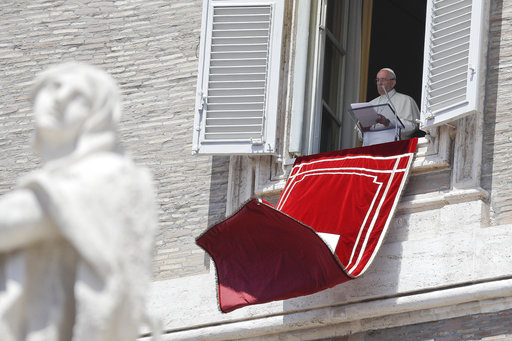Pope names cardinals for Laos, Mali, Sweden, Spain, Salvador

Pope Francis delivers his message during the Regina Coeli noon prayer in St. Peter’s Square at the Vatican, Sunday, May 21, 2017. (AP Photo/Gregorio Borgia)
VATICAN CITY — In a surprise announcement Sunday, Pope Francis named five new cardinals, for Spain, El Salvador and three countries where Catholics are a tiny minority: Mali, Laos and Sweden.
“Their origin, from different parts of the world, manifests the universality of the Church spread out all over the Earth,” Francis said, speaking from the window of the Apostolic Palace to thousands of faithful in St. Peter’s Square.
Those chosen are Monsignor Jean Zerbo, archbishop of Bamako, Mali; Monsignor Juan Jose Omella, archbishop of Barcelona, Spain; Monsignor Anders Arborelius, bishop of Stockholm; Monsignor Louis-Marie Ling Mangkhanekhoun, apostolic vicar of Pakse, Laos; and Monsignor Gregorio Rosa Chavez, an auxiliary bishop in San Salvador, El Salvador.
Francis will formally elevate the churchmen to cardinal’s rank in a ceremony at the Vatican on June 28. Then the new “princes of the church,” as the red-hatted, elite corps of churchmen who elect popes are known, will co-celebrate Mass with Francis the next day, the Feast Day of Saints Peter and Paul, an important Vatican holiday.
Since being elected pontiff in 2013, Francis has made a point of visiting his flock in places where Catholics are in the minority, as well as of working to improve relations between churches and among believers of different faiths.
Article continues after this advertisementHis brief pilgrimage last year to Sweden, where Lutherans are the Christian majority, was hailed by some as instrumental in helping to improve relations between the two churches. While there, he joined Lutheran leaders in a common commemoration of the Protestant Reformation that divided Europe five centuries ago.
Article continues after this advertisementArborelius, who is 67, converted to Catholicism when he was 20. In 1998, when he was consecrated as a bishop in Stockholm’s Catholic cathedral, Arborelius became Sweden’s first Catholic bishop, of Swedish origin, since the times of the Reformation,
In Mali, a country bloodied by Islamist extremism, Muslims constitute the predominant religious majority.
Zerbo’s clerical resume reveals him to be a churchman working for reconciliation in society, a virtue repeatedly stressed by Francis. The Vatican noted that Zerbo, 73, who was named an auxiliary bishop of Bamako in 1998 and 10 years later was made that city’s archbishop, has played a role in peace negotiations.
Extremists attacked a hotel in Bamako in 2015, killing 19 people. Last month, the U.N. peacekeeping chief for Mali called the security situation there alarming, warning that extremist groups operating under the al-Qaida banner were carrying out more sophisticated attacks and Islamic State militants were slowly making inroads.
There has been slow progress in implementing a peace deal reached in June 2015 between Mali’s government, Tuareg separatists and armed groups in the north.
In Laos, the tiny Catholic community has often struggled to persevere, including under communist-led rule. Mangkhanekhoun, 73, was ordained a priest in 1972 and has served as a bishop since 2001. The Vatican paid tribute to his work in visiting faithful in mountain villages. Since early this year, he has served as apostolic administrator in Vientiane.
Catholicism has been the majority religion in Spain and in El Salvador, although in parts of Central and South America, evangelical Protestant sects have been gaining converts from the Catholic church.
The resume of Chavez, 74, also includes credentials valued by the pope, who has made serving the poor a key focus of the Catholic church’s mission. Chavez heads the Latin American division of Caritas, the Catholic charity. He was appointed an auxiliary bishop in 1982 for San Salvador, where he now will be based as a cardinal after serving as a parish priest in the city.
Francis’ pick for the Spain cardinal’s post, Omella, 71, worked as a missionary in Zaire earlier in his career and serves on the Vatican’s powerful Congregation of Bishops office. Since December 2015, he has been archbishop of Barcelona.
In announcing his selections, Francis expressed hope that the new cardinals with their work and “their advice will sustain me more intensely in my service as bishop of Rome, universal pastor of the church.” In other remarks to the faithful in the square, Francis referred to the situation of another Catholic minority — Chinese whose loyalty to the pope has put them at odds with authorities of the state-sanctioned Catholic church in China, and sometimes brought persecution.
He prayed that Catholics in China would be able to bring their “personal contribution for the communion among believers and harmony in the entire society.”
Francis is eager to see improved Vatican-China relations. Both sides have for decades been at odds over Chinese authorities’ insistence that they have the right to appoint bishops, a prerogative the Vatican says only belongs to the pope.
He urged Catholics in China to “stay open to meeting and dialogue, always.”